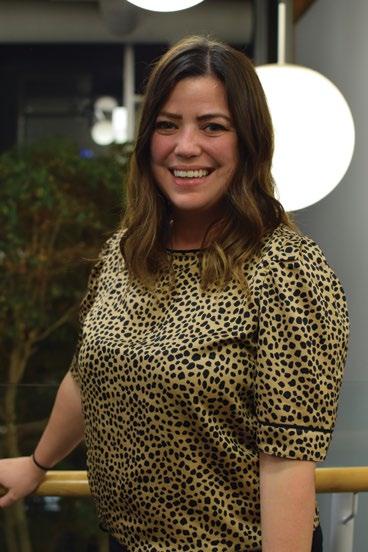
4 minute read
Alumni Spotlight
by IMS Magazine
Marrying Science and Business
By Rehnuma Islam
Advertisement
Dr. Rebecca Ruddy (PhD) Business Intelligence Associate at GSK

Photo by Krystal Jacques
Glaxosmithkline (GSK) is a United Kingdom pharmaceutical company comprised of separate entities that are involved in vaccines, pharmaceuticals, and consumer healthcare. Currently, GSK holds 4% of the pharmaceutical market share, having a significant impact on our everyday life.1 Modern pharmaceutical companies determine in part the direction of health care, provides society with therapeutics, and promises a healthier future. A key factor contributing to the company’s success is its ability to predict the future of healthcare and provide care in fields that have the most promise for therapies. So what guides a company in strategizing products for healthcare? Dr. Rebecca Ruddy plays a crucial role in forecasting the outcomes of company products based on previous trends and current market variables. Her ability to make assumptions and make predictions about the market relies heavily on the skills developed during her doctoral studies at the Institute of Medical Science (IMS).
Rebecca grew up in Ottawa as the middle child of a family of 5 siblings. Her parents instilled in their kids the importance of higher education. In school, she excelled in the sciences and continued her postsecondary education at McGill University studying Biochemistry. Rebecca knew she wanted to pursue graduate school and for her Masters, she focused on translational research. “I found what I thought was the interesting research and that kind of just naturally led me into neuroscience”. Her quest for good mentorship, laboratory environment, and interesting research topics led her to complete her Master of Science degree in the laboratory of Dr. Amy Ramsey. Rebecca researched the effect of ketamine on alterations in dendritic spine density in different regions of the mouse brain. “My Masters at (the) Ramsay lab was a great experience. I really learned a lot and wanted to stay in neuroscience, but I wanted to explore a different area of it”. She subsequently completed her PhD within the laboratory of Dr. Cindi Morshead, where she studied, “how to repair and activate stem cells in the brain to improve cognition”. Under the support of “very strong female supervisors”, -a growing field of influential women in science, technology, engineering and mathematics- Rebecca herself took on multiple responsibilities and leadership roles.
While completing her PhD, she became the Co-Editor-in-Chief for the IMS magazine, where her communication and writing skills flourished. She also volunteered for a volunteer consulting agency that allowed her to discover the intricacies of writing a business proposal and developing strategies for project management. To further her business communication skills, she also completed a course called “Healthcare Consulting” at the Rotman School of Management. Having learned client communication and presented a consulting project during the course, helped during the interview process at GSK. Defending a PhD is daunting, however Rebecca completed her PhD while working for GSK. She applied the skills developed during her PhD to launch her career at one of the largest pharmaceutical companies.

Data is everywhere, from collecting data as a PhD student to making datadriven decisions in the workplace. Thus, it is very important to discern how applicable the data is, when interpreting and utilizing the information to answer pertinent research and societal questions. At GSK, Rebecca performs this role as a Business Intelligence Associate where she works to answer questions involving various topics such as market share and forecasting drug sales. For example, “How is this brand performing compared to the targets?” This requires gathering the right information from the company’s database and presenting it in a concise and easily understandable fashion. Rebecca’s ability to interpret and communicate data to people from a business background, stems from her experience as a PhD student; where she developed skills in communicating science towards the general public. This experience was on display when her PhD thesis was featured on BBC World Service’s Newshour programme. Decisions rely heavily on data. The power of reaching the proper conclusions from the data can have gross impact on a company and society. Rebecca’s role as a PhD student has allowed her to approach data interpretation and transformation with integrity. The value from gaining a business background has allowed her to marry business to science and generate data-driven decisions at GSK.
Teamwork is important within a large corporation. For her PhD, Rebecca worked alongside lab members in completing projects within the lab. In her current role at GSK, teamwork has become an integral component. Her team at the Mississaugabased division of the company includes an 8-member team, 5 of whom are females, support one another by ensuring unbiased data interpretation and reporting -similar to peer-review. Looking back, Rebecca notes, “I didn’t find that you get lost in the shuffle in a large corporation. I feel very supported in my role and on my team, and you do have a voice which I think might surprise some people when you think about a big corporation”. Her schedule includes many meetings, presentations, and data communication. Outside of work, her friends, and family support her as she grows into her new shoes at GSK.
As Rebecca continues in her career, we look forward to seeing Rebecca lead data science towards promising therapies.
References 1. Verdict Media Ltd. The top ten pharmaceutical companies by market share in 2018. https://www.pharmaceutical-technology.com/ features/top-pharmaceutical-companies/










